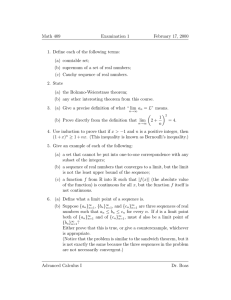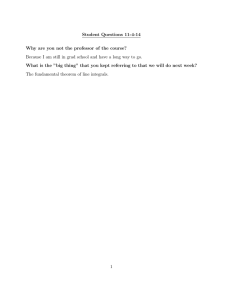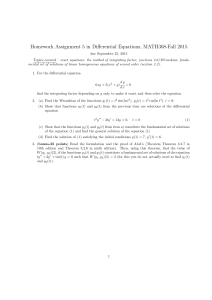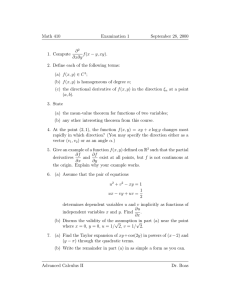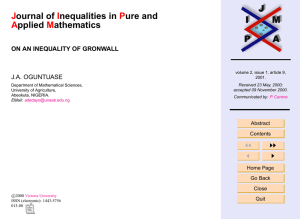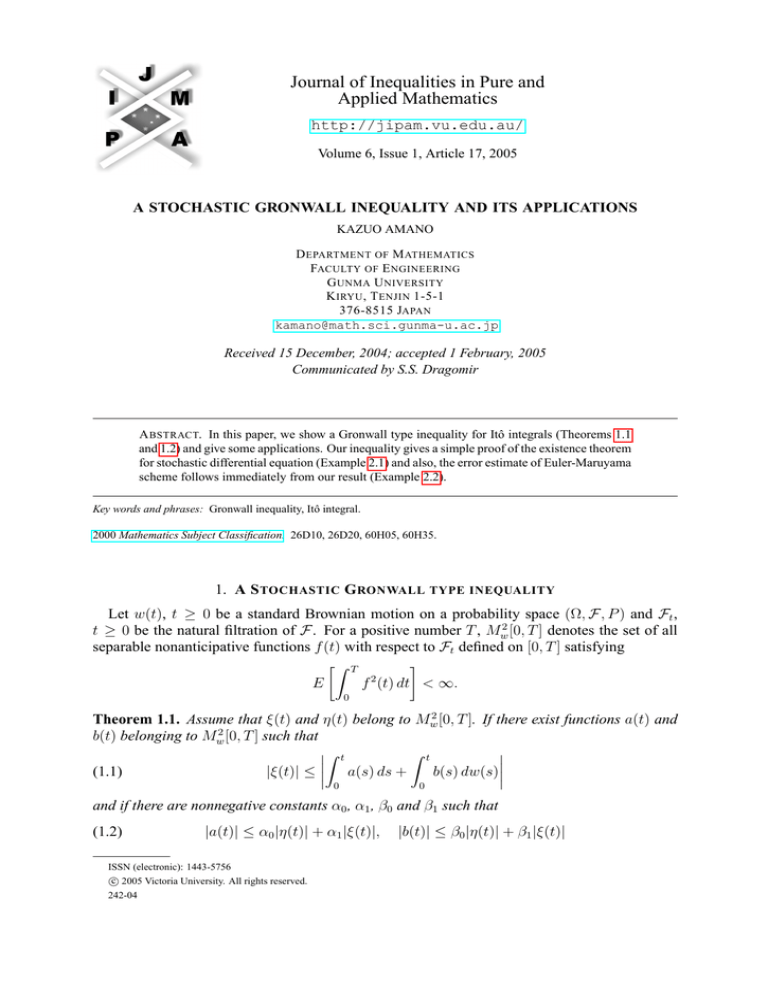
Journal of Inequalities in Pure and
Applied Mathematics
http://jipam.vu.edu.au/
Volume 6, Issue 1, Article 17, 2005
A STOCHASTIC GRONWALL INEQUALITY AND ITS APPLICATIONS
KAZUO AMANO
D EPARTMENT OF M ATHEMATICS
FACULTY OF E NGINEERING
G UNMA U NIVERSITY
K IRYU , T ENJIN 1-5-1
376-8515 JAPAN
kamano@math.sci.gunma-u.ac.jp
Received 15 December, 2004; accepted 1 February, 2005
Communicated by S.S. Dragomir
A BSTRACT. In this paper, we show a Gronwall type inequality for Itô integrals (Theorems 1.1
and 1.2) and give some applications. Our inequality gives a simple proof of the existence theorem
for stochastic differential equation (Example 2.1) and also, the error estimate of Euler-Maruyama
scheme follows immediately from our result (Example 2.2).
Key words and phrases: Gronwall inequality, Itô integral.
2000 Mathematics Subject Classification. 26D10, 26D20, 60H05, 60H35.
1. A S TOCHASTIC G RONWALL
TYPE INEQUALITY
Let w(t), t ≥ 0 be a standard Brownian motion on a probability space (Ω, F, P ) and Ft ,
t ≥ 0 be the natural filtration of F. For a positive number T , Mw2 [0, T ] denotes the set of all
separable nonanticipative functions f (t) with respect to Ft defined on [0, T ] satisfying
Z T
2
E
f (t) dt < ∞.
0
Theorem 1.1. Assume that ξ(t) and η(t) belong to Mw2 [0, T ]. If there exist functions a(t) and
b(t) belonging to Mw2 [0, T ] such that
Z t
Z t
(1.1)
|ξ(t)| ≤ a(s) ds +
b(s) dw(s)
0
0
and if there are nonnegative constants α0 , α1 , β0 and β1 such that
(1.2)
|a(t)| ≤ α0 |η(t)| + α1 |ξ(t)|,
ISSN (electronic): 1443-5756
c 2005 Victoria University. All rights reserved.
242-04
|b(t)| ≤ β0 |η(t)| + β1 |ξ(t)|
2
K AZUO A MANO
for 0 ≤ t ≤ T , then we have
√
2
Eξ (t) ≤ 4 α0 t + β0
(1.3)
2
Z t
√
2
exp 4t (α1 t + β1 )
Eη 2 (s) ds
0
for 0 ≤ t ≤ T .
Proof. Since
Z
t
E
2
Z t
b(s) dw(s) = E
b2 (s) ds,
0
0
(1.1) implies, by Minkowsky and Schwarz inequalities,
Z t
12 Z t
12
12
2
2
2
+
Eb (s) ds .
Eξ (t) ≤ t
Ea (s) ds
0
0
Direct computation gives, by (1.2),
Z t
21
Z t
12
Z t
12
√
√
2
2
2
t
Ea (s) ds
≤ 2tα0
Eη (s) ds
+ 2tα1
Eξ (s) ds ,
0
0
0
12
Z t
12
21
Z t
t
√
√
Eb2 (s) ds
≤ 2β0
Eη 2 (s) ds
+ 2β1
Eξ 2 (s) ds .
Z
0
0
0
Combining the above estimates, we obtain
Z t
Z t
√
√
2
2
2
2
(1.4)
Eξ (t) ≤ 4(α0 t + β0 )
Eη (s) ds + 4(α1 t + β1 )
Eξ 2 (s) ds
0
0
for 0 ≤ t ≤ T .
Let us fix a nonnegative number t0 ≤ T arbitrarily. Then, for any δ > 0, the last inequality
(1.4) shows
Z t0
Z t
√
√
d
2
2
2
2
log 4(α0 t0 + β0 )
Eη (s) ds + 4(α1 t0 + β1 )
Eξ (s) ds + δ
dt
0
0
√
≤ 4(α1 t0 + β1 )2
almost everywhere in [0, t0 ]. Integrating this estimate from 0 to t0 with respect to t, we get
!
Rt
Rt
√
√
4(α0 t0 + β0 )2 0 0 Eη 2 (s) ds + 4(α1 t0 + β1 )2 0 0 Eξ 2 (s) ds + δ
log
Rt
√
4(α0 t0 + β0 )2 0 0 Eη 2 (s) ds + δ
√
≤ 4t0 (α1 t0 + β1 )2 .
Therefore, by (1.4), we have
2
√
2
Eξ (t0 ) ≤ exp 4t0 (α1 t0 + β1 )
√
2
Z
4(α0 t0 + β0 )
t0
2
Eη (s) ds + δ .
0
Now, letting δ → 0, we obtain (1.3).
In case ξ(t) is a step function, a weak assumption (1.6) will be enough to show the inequality
(1.3), which would play an important role in the error analysis of the numerical solutions of
stochastic differential equations.
J. Inequal. Pure and Appl. Math., 6(1) Art. 17, 2005
http://jipam.vu.edu.au/
S TOCHASTIC G RONWALL I NEQUALITY
3
Theorem 1.2. Assume that ξ(t) and η(t) belong to Mw2 [0, T ] and ξ(t) is a step function such
that
(1.5)
ξ(t) = ξ(tn )
when tn ≤ t < tn+1
for n = 0, 1, 2, . . . , N − 1, where N is a positive integer and {tn }N
n=0 is a partition of the
interval [0, T ] satisfying 0 = t0 < t1 < t2 < · · · < tN −1 < tN = T . If there exist functions
a(t) and b(t) belonging to Mw2 [0, T ] such that
Z tn
Z tn
(1.6)
|ξ(tn )| ≤ a(s) ds +
b(s) dw(s)
0
0
is valid for each n = 0, 1, 2, . . . , N and if there are nonnegative constants α0 , α1 , β0 and β1
satisfying (1.2) for 0 ≤ t ≤ T , then we have (1.3) for 0 ≤ t ≤ T .
Proof. As in the proof of Theorem 1.1, we have
Z tn
Z
√
√
2
2
2
2
Eη (s) ds + 4(α1 tn + β1 )
Eξ (tn ) ≤ 4(α0 tn + β0 )
0
tn
Eξ 2 (s) ds
0
for n = 0, 1, 2, . . . , N ; this implies, by (1.5),
Z t
Z t
√
√
2
2
2
2
Eξ (t) ≤ 4(α0 t + β0 )
Eη (s) ds + 4(α1 t + β1 )
Eξ 2 (s) ds
0
0
for 0 ≤ t ≤ T .
The remaining part of the proof is exactly same as that of Theorem 1.1.
2. A PPLICATIONS
Throughout this section, we assume that ξ(t) ∈ Mw2 [0, T ] is a solution of the stochastic
differential equation
dξ(t) = a(t, ξ(t)) dt + b(t, ξ(t)) dw(t),
0≤t≤T
satisfying the initial condition ξ(0) = ξ0 , where a(t, x) and b(t, x) are real-valued functions
defined in [0, T ] such that
|a(t, x)|, |b(t, x)| ≤ K(1 + |x|),
|a(t, x) − a(s, y)|, |b(t, x) − b(s, y)| ≤ L(|t − s| + |x − y|).
Here K and L are nonnegative constants.
Example 2.1. Theorem 1.1 gives a simple proof of the existence theorem for stochastic differential equations.
We use Picard’s method. Let us consider a sequence {ξn (t)} defined by ξ0 (t) = ξ0 and
Z t
Z t
ξn+1 (t) = ξ0 +
a(s, ξn (s)) ds +
b(s, ξn (s)) dw(s)
0
0
for n = 0, 1, 2, . . . . Then, we easily have
Z t
ξn+1 (t) − ξn (t) =
a(s, ξn (s)) − a(s, ξn−1 (s)) ds
0
Z t
+
b(s, ξn (s)) − b(s, ξn−1 (s)) dw(s)
0
J. Inequal. Pure and Appl. Math., 6(1) Art. 17, 2005
http://jipam.vu.edu.au/
4
K AZUO A MANO
and the Lipschitz continuity of a(t, x) and b(t, x) implies
a(s, ξn (s)) − a(s, ξn−1 (s)) ≤ L|ξn (s) − ξn−1 (s)|,
b(s, ξn (s)) − b(s, ξn−1 (s)) ≤ L|ξn (s) − ξn−1 (s)|.
Hence, Theorem 1.1 with α0 = β0 = L and α1 = β1 = 0 shows
Z t
√
2
2
2
E|ξn+1 (t) − ξn (t)| ≤ 4L ( t + 1)
E|ξn (s) − ξn−1 (s)|2 ds
0
for n = 1, 2, 3, . . . ; the recursive use of this estimate gives
√
2
2 n
4L
(
t
+
1)
t
E |ξn+1 (t) − ξn (t)|2 ≤
sup E|ξ1 (s) − ξ0 (s)|2 .
n!
0≤s≤t
Consequently, as is well-known, the convergence of {ξn (t)} follows.
By virtue of Theorem 1.1 with α0 = β0 = 0 and α1 = β1 = L, the uniqueness of the solution
is clear.
Example 2.2. The error estimate of the Euler-Maruyama scheme
n = 0, 1, 2, . . . , N − 1
ξn+1 = ξn + a(tn , ξn )∆t + b(tn , ξn )∆wn ,
follows immediately from Theorem 1.2, where N is a sufficiently large positive integer, ∆t =
T /N , tn = n∆t and ∆wn = w(tn+1 ) − w(tn ) for n = 0, 1, 2, . . . , N − 1.
Since
Z
tn+1
tn+1
Z
ξn+1 = ξn +
a(tn , ξn )ds +
b(tn , ξn )dw(s),
tn
tn
Z
tn+1
ξ(tn+1 ) = ξ(tn ) +
Z
tn+1
a(s, ξ(s))ds +
b(s, ξ(s))dw(s),
tn
tn
we have
Z
tn+1
a(tn , ξn ) − a(s, ξ(s)) ds
ξn+1 − ξ(tn+1 ) = ξn − ξ(tn ) +
tn
tn+1
Z
b(tn , ξn ) − b(s, ξ(s)) dw(s).
+
tn
Now, for n = 0, 1, 2, . . . , N − 1, if we put
ε(s) = ξn − ξ(tn ),
f (s) = a(tn , ξn ) − a(s, ξ(s)),
g(s) = b(tn , ξn ) − b(s, ξ(s))
when tn ≤ s < tn+1 and
ε(tN ) = ξN − ξ(tN ),
f (tN ) = a(tN , ξN ) − a(tN , ξ(tN )),
g(tN ) = b(tN , ξN ) − b(tN , ξ(tN )),
then we obtain
Z
ε(tn ) =
Z
f (s) ds +
0
J. Inequal. Pure and Appl. Math., 6(1) Art. 17, 2005
tn
tn
g(s) dw(s)
0
http://jipam.vu.edu.au/
S TOCHASTIC G RONWALL I NEQUALITY
5
for n = 0, 1, 2, . . . , N . The Lipschitz continuity of a(t, x) and b(t, x) shows
˜
|f (s)| ≤ L ∆t + |ξ(s) − ξ(s)|
+ |ε(s)| ,
˜
|g(s)| ≤ L ∆t + |ξ(s) − ξ(s)|
+ |ε(s)| ,
˜
˜ N ) = ξ(tN ) .
where ξ(s)
= ξ(tn ) when tn ≤ s < tn+1 for n = 0, 1, 2, . . . , N − 1 and ξ(t
Hence, Theorem 1.2 with α0 = α1 = β0 = β1 = L shows
Z
√
√
t
2
2
2
2
2
2
˜
Eε (t) ≤ 4L ( t + 1) exp 4L ( t + 1) t
E ∆t + |ξ(s) − ξ(s)|
ds.
0
It follows from the fundamental property of Itô integrals that
˜ 2 ≤ C∆t,
E |ξ(s) − ξ(s)|
where C is a nonnegative constant depending only on T , K and L. Combining the above
estimates, we obtain
Eε2 (t) = O(∆t)
for any 0 ≤ t ≤ T when ∆t → 0; the error estimate of the Euler-Maruyama scheme is proved.
Our Gronwall type inequality works for other numerical solutions of stochastic differential
equations.
R EFERENCES
[1] A. FRIEDMAN, Stochastic Differential Equations and Applications, Volume I, Academic Press,
1975.
[2] K. ITÔ AND H. P. MCKEAN, Diffusion Processes and Their Sample Paths, Springer-Verlag, Berlin,
1965.
[3] P.E. KLOEDEN AND E. PLATEN, Numerical Solution of Stochastic Differential Equations,
Springer-Verlag, 1992.
[4] D.W. STROOCK AND S.R.S. VARADHAN, Multidimensional Diffusion Processes, Springer, 1982.
J. Inequal. Pure and Appl. Math., 6(1) Art. 17, 2005
http://jipam.vu.edu.au/


